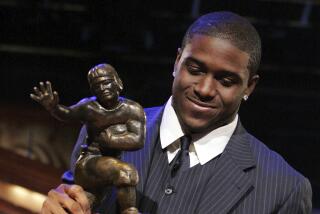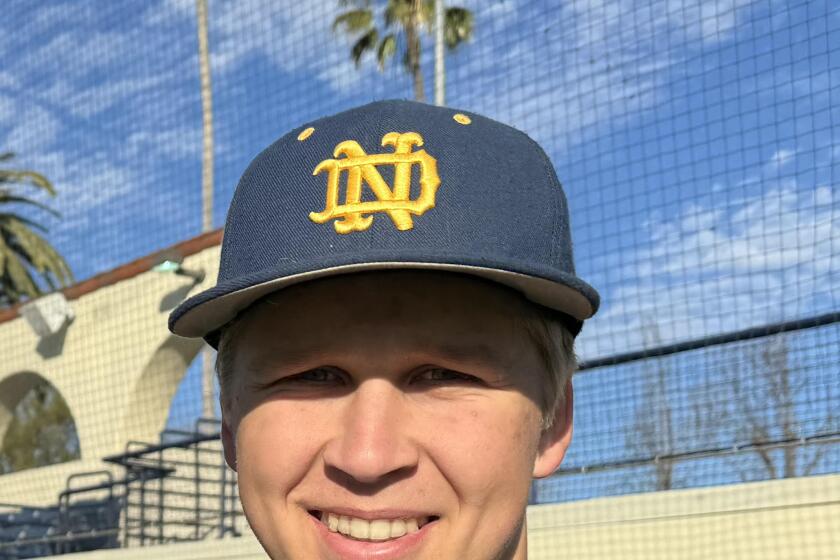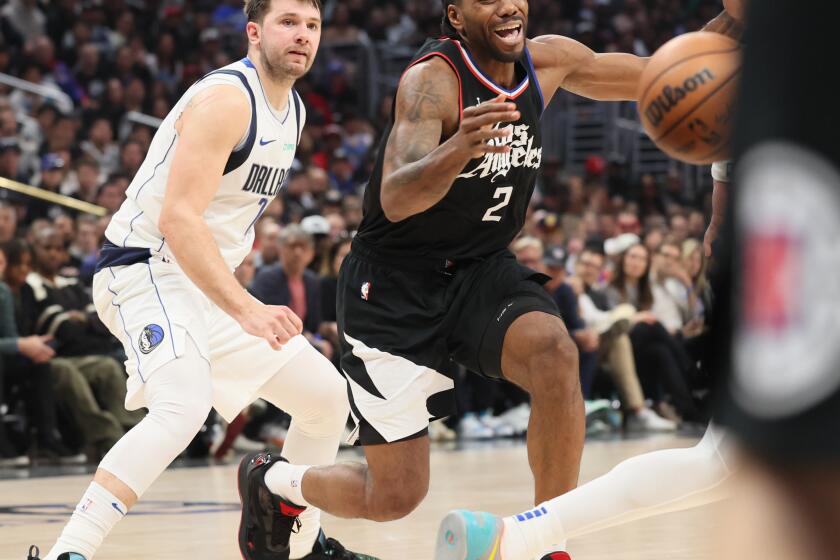Quitting was an option, but Chang chose another
Michael Chang almost quit.
The tennis champion who never threw in the towel almost walked out on the defining match of his career.
It was the fourth round at the 1989 French Open, and the 17-year-old Chang already had defied long odds by pushing Ivan Lendl, the world’s No. 1-ranked player, to a deciding fifth set.
With leg cramps leaving him unsteady on his feet atop the red clay at Roland Garros in Paris, Chang tried to relieve his distress by swigging water, chomping on bananas and standing during changeovers. He resorted to lofting lob shots to slow the pace and wiped out a two-set deficit against the three-time French Open champion.
Then, early in the fifth set, he figured he’d had enough.
“I was this close to going up to the chair umpire and saying, ‘I can’t play anymore,’ ” Chang, 37, says during an interview near his Mission Viejo home, holding his right thumb and forefinger millimeters apart. “I actually walked to the service line and the umpire was looking at me -- and Lendl was looking at me -- and it crossed my mind to say, ‘Who am I kidding here? I’m playing against the No. 1 player in the world, I’m throwing these lob shots and I can’t move worth beans.’ . . .
“And I started to think to myself, ‘I’ll get into the locker room and people will pat me on the back. I’ll get to the press conference and people will say, ‘Great effort today.’ ”
But even at that age -- before he forged his reputation as a dogged competitor who refused to quit on points, much less matches -- Chang knew he had to carry on.
“So when I got to that service line,” he says, “I had an unbelievable conviction of heart like, ‘Hey, what are you doing?’ It was almost as if God was saying, ‘You fought this hard to win the third and fourth sets and now you’re going to call it quits?’ It dawned on me that if I were to quit then, it would be that much easier to quit every other time I experienced difficulty.
“And so my thought process after that was, ‘Maybe I can’t control the winning or losing, but I can finish the race.’ ”
It was a blueprint he followed the rest of his career, the Southern California-reared son of Chinese emigrants maximizing his potential as much through perseverance as skill.
Recharged mentally, he ousted Lendl in a match lasting more than 4 1/2 hours. Once, he even served underhanded, unnerving the usually stoic Lendl.
Marveled Tony Trabert, a former French Open champion, “I’ve never seen a player show so much courage on a tennis court.”
Days later, the 15th-seeded Chang topped third-seeded Stefan Edberg in a five-set final, becoming the youngest male winner of a Grand Slam tournament and the first U.S. winner at Roland Garros in 34 years -- since Trabert won in 1955.
“He just keeps coming back,” Edberg said of the new champion, who then spent the rest of his career trying to recapture his crowning moment, which he never could.
The 5-foot-9, 160-pound Chang reached the final in three other Grand Slam events but never won another major title. Still, when he retired in 2003, he’d won 34 tournaments and more than $19 million in prize money, his abundant energy and iron will often frustrating opponents who were bigger and stronger.
Chang reached as high as No. 2 in the world, and last summer he was inducted into the International Tennis Hall of Fame.
“I look back with a lot of thankfulness,” he says, “because my situation was a little bit unique. There are not a lot of Asians out there playing on tour, or smaller guys doing that well.”
In retirement, Chang heads the Chang Family Foundation, which oversees Christian-based sports programs, and continues to travel the world playing on the Champions Tour.
He breeds tropical fish, a longtime hobby, and says he carries a two handicap in golf even though he hasn’t played much since October, when he was married to Amber Liu, a former Stanford tennis player and two-time NCAA singles champion.
As a player, he notes, “it would have been tough to top what happened in Paris in ‘89” -- especially considering the events that were unfolding simultaneously in his parents’ homeland.
“A lot of people forget that Tiananmen Square was going on,” Chang says of the 1989 civilian protests in Beijing that were quelled by military gunfire, resulting in more than 100 deaths. “The crackdown that happened was on the middle Sunday at the French Open, so if I was not practicing or playing a match, I was glued to the television, watching the events unfold. . . .
“I often tell people I think it was God’s purpose for me to be able to win the French Open the way it was won because I was able to put a smile on Chinese people’s faces around the world at a time when there wasn’t much to smile about.”
Lendl probably didn’t see it that way, but Chang says the Czech was conciliatory the next time they met, weeks later.
“He walked straight up to me,” Chang says, “stuck out his hand and said, ‘Congratulations. Great job at the French Open.’ ”
That wasn’t the first time Chang heard those words, of course.
Nor would it be the last.
--
More to Read
Get our high school sports newsletter
Prep Rally is devoted to the SoCal high school sports experience, bringing you scores, stories and a behind-the-scenes look at what makes prep sports so popular.
You may occasionally receive promotional content from the Los Angeles Times.






